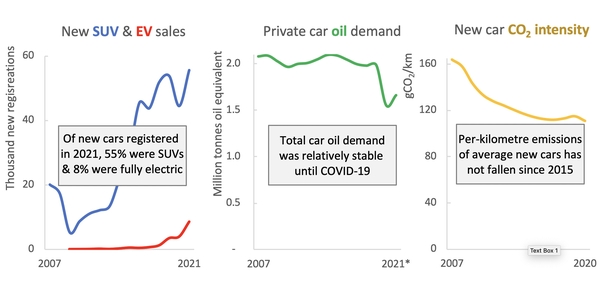Why the reign of SUVs on Irish roads should end 07 Feb 2022

Opinion: there are many solutions to tackle the problem of heavy, fuel-hungry SUVs, but all require bold action from policymakers by Dr. Hannah Daly and Vera O'Riordan, MaREI Centre, Energy Policy & Modelling Group, Environmental Research Institute, UCC
Ireland must rapidly reduce fossil fuel consumption to meet climate obligations. As one of the many changes needed, the prevalence of heavy, fuel-hungry SUVs on Irish roads should end. But instead, SUV sales are growing rapidly: 55,000 were sold in 2021 (nearly 55% of all new cars). By contrast, only 8,600 fully electric vehicles were sold that year. SUVs' greater weight and height mean that they emit around 20% more carbon dioxide than medium-sized cars, and far more than electric vehicles.
As a result, the efficiency improvement of new cars has flatlined and private car oil demand has not been decreasing in Ireland (with the exception of 2020 as a result of Covid restrictions). SUVs have been the second-biggest driver of climate change globally over the past decade. SUVs are also favoured by city-dwellers as much as country folk: nearly 19,000 were sold in Dublin last year, nearly half of new cars registered in that county.

This trend in SUV sales, with their long lifetime, makes the imperative of rapidly reducing planet-warming greenhouse gases far more difficult. As Prof Kevin Anderson recently told the Joint Committee on Environment and Climate Action, "if there's a climate emergency, you don’t sell SUVs".
Some popular SUV models could lock in 60 tonnes of carbon dioxide emissions over their lifetime. This is more than the amount that climate scientists say is the remaining global carbon budget for a 50% chance of limiting global warming to 1.5°C, divided equally among each person on the planet.
Modelling and research we undertook at UCC to inform the Climate Change Advisory Council's deliberations on carbon budgets shows that if we do not reduce fossil fuel vehicle sales and their usage significantly and immediately, costly scrappage schemes will be needed later this decade to meet national climate targets.
Some of the growth in electric car sales is also driving SUV sales: around one-third of new electric vehicles registered in 2021 were SUVs. For some, like parents who need three child seats, or those who need to tow, an electric SUV may be the best option.
But wholesale electrification of SUVs is problematic. While electric SUVs are certainly better for the climate than conventional ones, they still suffer from many downsides. Firstly, they cause more carbon dioxide emissions than smaller electric vehicles. For example, even though plug-in hybrid vehicles are advertised as low emitting, they typically emit two to four times more in reality than advertised.
Their size also means that they require larger batteries, placing greater pressure on critical minerals, and require more electricity. This is problematic when the Irish electricity grid is under strain and the growth in renewables is facing obstacles.
Electrified SUVs also share the same dangers as fossil fuelled ones: Their larger size and elevated chassis which make them more comfortable to drive increases the "blind zone", making streets less safe for other road users, especially children. They also make visibility poorer for other drivers, and heavier vehicles are more likely to have better outcomes in a collision with a smaller vehicle. This incentivises others to drive bigger cars to feel safe – a self-reinforcing loop – at the expense of vulnerable road users and locking society into the broader problem of car dependence.
It's no surprise that 60% of primary students are now driven to school. Until the 1990s, walking and cycling were the main mode of school travel, another self-reinforcing loop as parents keep their children safe by driving them to school.
There are many solutions to tackle the SUV problem, which will need bold action from policymakers. These solutions – taxation, education and exclusion – have parallels with the successful campaign against cigarette smoking.
Hopefully in a decade, we will wonder how we tolerated oversized cars clogging up public space
One option is to reduce SUV sales by reflecting their costs to society (what economists call the "external cost") in the sales price. For example, France has introduced a progressive tax on new cars according to weight. Another is to factor in the lifetime carbon emissions with a tax at the point of vehicle sale rather than during use.
The heavy marketing of high-emitting vehicles should also be regulated. France has also recently brought in climate warnings on all car ads, an intervention that could be introduced here, like health warnings on cigarette packets and public health campaigns discouraging their sale and use.
Some, including academics and politicians, have suggested an outright ban on SUV sales for non-commercial uses, or from their entering cities, given the additional danger they pose to cyclists and pedestrians. France is again an example of progressive action: In Paris, most streets with schools are now closed to traffic.
Like smoking, a social tipping point could be close, where social acceptance of SUVs and car-dependence in general declines rapidly. Hopefully in a decade, we will wonder how we tolerated oversized cars clogging up public space, like we now look back in amazement that smoking indoors was tolerated.